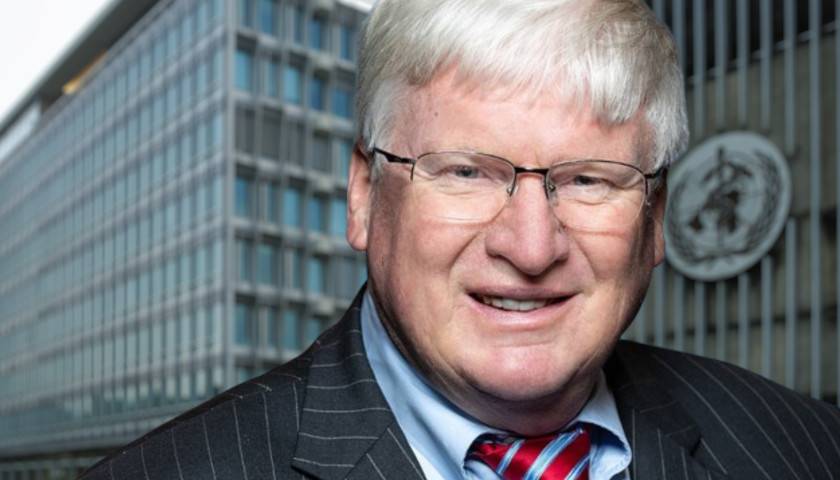by Madeleine Hubbard
The World Health Organization’s pending global pandemic agreement and the International Criminal Court’s application for arrest warrants of leaders of a democratic country fighting terrorists are raising concerns about globalism, which critics say is supported by President Joe Biden’s policies.
“We ought to get out of the WHO altogether. That’s obvious Wisconsin congressman,” Rep. Glenn Grothman (pictured above) told the “Just the News, No Noise” TV show this week.
“We do not want any future American administration, like the Biden administration, to say, because the WHO is doing something – recommending certain vaccines, recommending certain treatments – that we, therefore, have any obligation whatsoever to go along with that sort of thing,” the Republican lawmaker added.
The WHO released a draft of its global pandemic agreement last month, and a final version of the document is expected to be decided by consensus during the World Health Assembly’s meeting from May 27 to June 1.
“It must be noted that it was a decision by Member States to embark on this process, in December 2021, which was an acknowledgement [sic] of their common desire to strengthen the world’s coordination action in terms of preparing for, preventing and responding to pandemics in light of COVID-19,” the WHO told Just the News.
Former Republican presidential candidate Michelle Bachmann, who has been raising the alarm on the issue since at least 2022, told “Just the News, No Noise” that under the treaty, the WHO “would be energized and supercharged and given even more powers, in fact, global powers to be able to call the shots on health.”
The concerns come even though the the current draft of the treaty includes safeguards to limit the WHO’s power.
“Nothing in the WHO Pandemic agreement shall be interpreted” as giving the WHO the authority alter or implement domestic laws, or to impose any mandates, including rules about travel, vaccinations, treatments and lockdowns, the draft states.
However, there are more than 300 amendment proposals for the treaty, and some of the proposals “would substantially increase the WHO’s health emergency powers and constitute intolerable infringements upon U.S. sovereignty,” according to a letter to President Joe Biden signed by all Senate Republicans earlier this month.
Bachmann said that if the treaty passes, “we would go back to what it was like under COVID, only worse, we’d have no right of appeal. … This would also create a surveillance state like the Communist Chinese would have. And this would again take away and restrict our constitutional liberties,” because of the vast number of things that the WHO considers things such as being health care.
The draft agreement “recognize[es] the importance and public health impact of growing threats such as climate change, poverty and hunger.”
However, it is unclear how the agreement’s language would increase surveillance beyond what is already allowed under current international law. The agreement states it is looking to “strengthen pandemic prevention and public health surveillance capacities, consistent with the International Health Regulations,” which is an existing agreement that requires countries, including the U.S., to report and respond to potential public health emergencies.
The current agreement is not finalized and negotiations are ongoing for it, but it’s not just Republicans who are expressing concerns about the agreement.
Human rights organizations, specifically Amnesty International, the Global Initiative for Economic, Social and Cultural Rights, the International Commission of Jurists and Human Rights Watch, argue that the agreement does not go far enough in preventing a global health disaster.
“Rather than acting on the lessons learned from the Covid-19 pandemic, the current proposed text offers a weak framework for ensuring that countries will be accountable for maintaining a rights-compliant response to future pandemics,” the four organizations wrote in a statement about the agreement in the fall.
Meanwhile, concerns about global governance are also being voiced in response to the ICC’s decision earlier this week to apply for arrest warrants against Israeli Prime Minister Benjamin Netanyahu and Israeli Defense Minister Yoav Gallant at the same time as Hamas leaders Yahya Sinwar, Mohammed Deif and Ismail Haniyeh.
Former Trump National Security Council official Robert Greenway said that Congress should “impose restrictions on the ICC,” just like the Trump administration did.
“The court’s rogue, it’s political, it serves no justifiable purpose. And as long as it’s pursuing partisan political objectives, it shouldn’t be supported by the United States, or the United Nations or the international community,” he also said.
House Speaker Mike Johnson, R-La., similarly blasted the ICC for making what he called a “baseless and illegitimate decision” to go after Netanyahu and Gallant.
While the future of both the ICC and the WHO pandemic agreement are unclear under Biden, if former President Donald Trump is reelected this fall, he may decide to restart the process of withdrawing from the WHO and reinstitute sanctions on the ICC.
– – –
Madeleine Hubbard is a reporter for Just the News.
Photo “Glenn Grothman” by US House of Representatives. Background photo “World Health Organization Headquarters” by Yann CC3.0.




